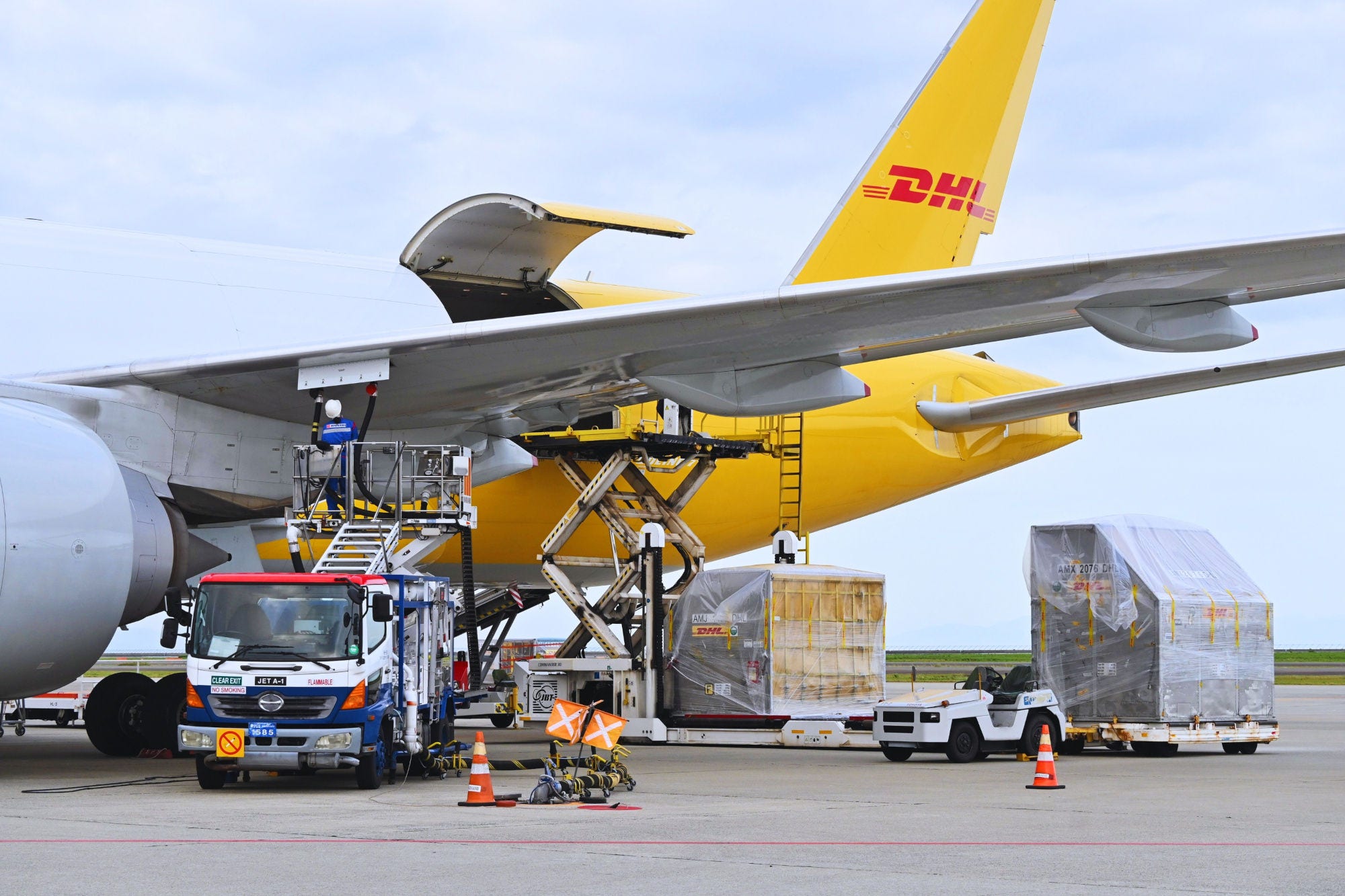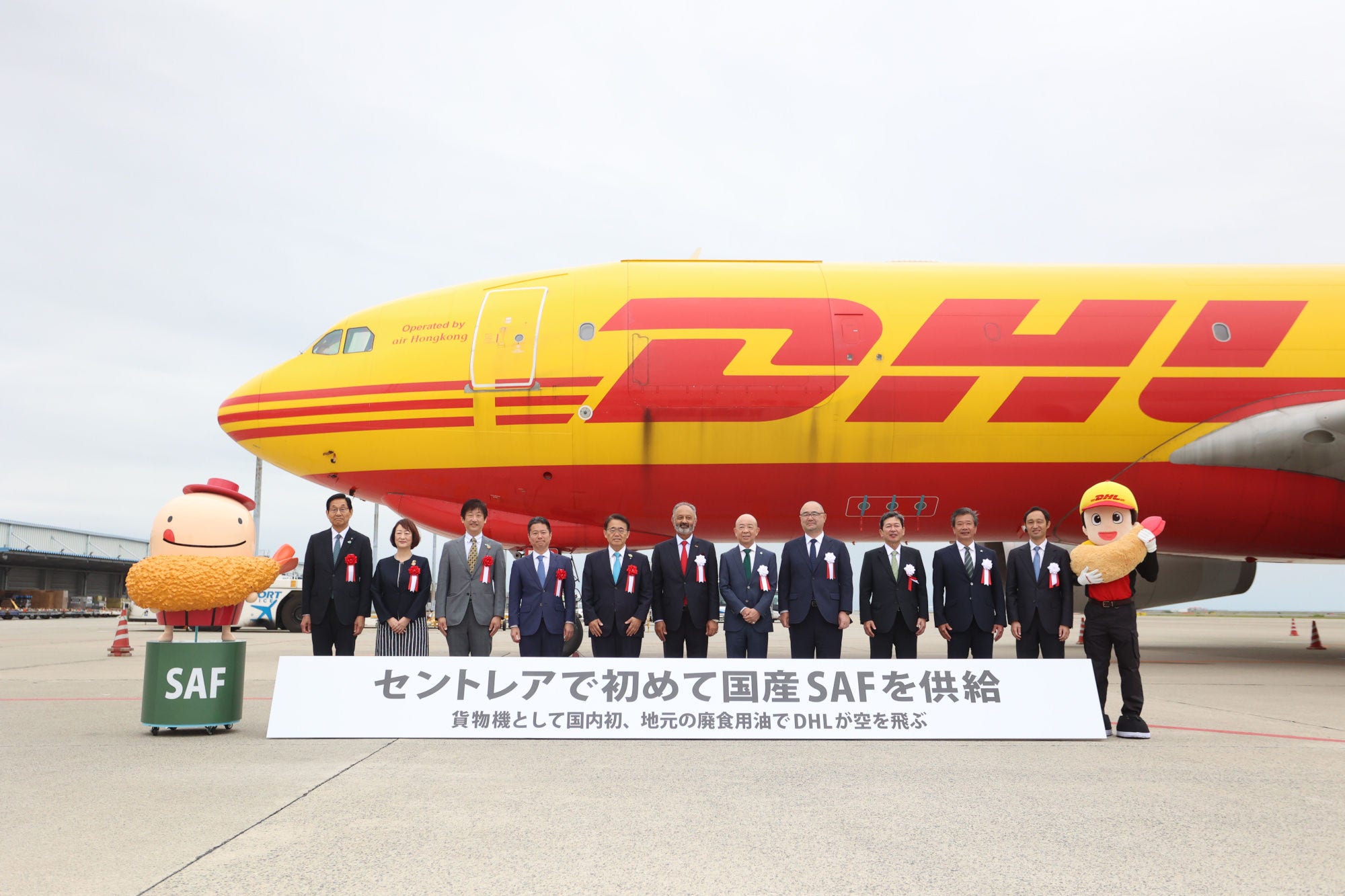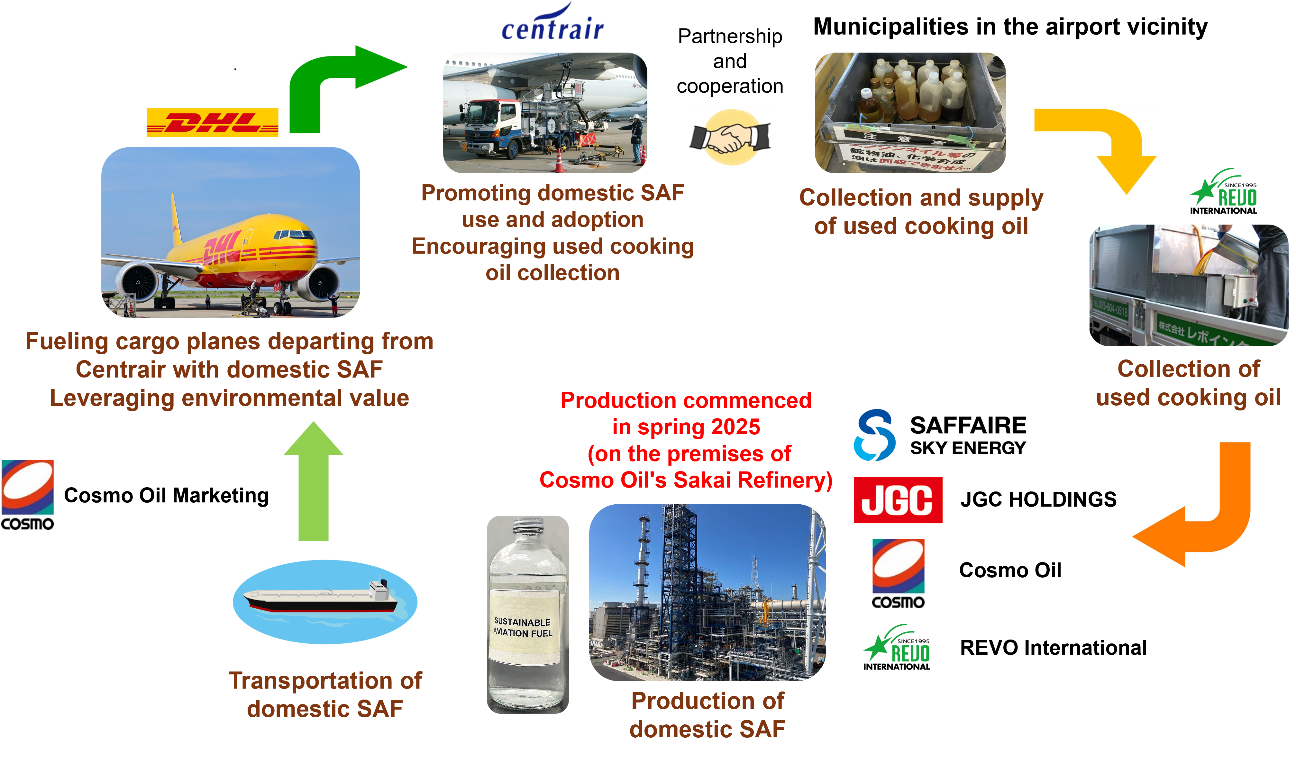Cosmo Energy Group Supplies Mass-Produced Domestic SAF for the First Time to a DHL-Operated Regular Air Freight Service Out of Centrair ~Promoting Resource Recycling via a Community-Driven SAF Supply Chain~
May 26, 2025
Cosmo Energy Holdings Co., Ltd.
Cosmo Oil Co., Ltd.
Cosmo Oil Marketing Co., Ltd.
Cosmo Oil Co., Ltd. (hereafter, “Cosmo Oil”) and Cosmo Oil Marketing Co., Ltd. (hereafter, “Cosmo Oil Marketing”), subsidiaries of Cosmo Energy Holdings Co., Ltd., are pleased to announce the successful supply of Japan’s first mass-produced domestic Sustainable Aviation Fuel (SAF)—derived from used cooking oil—to a regularly scheduled air freight service operated by DHL Express (head office: Bonn, Germany) at Chubu Centrair International Airport (hereafter, “Centrair”) on May 23.
This marks the first-ever supply of SAF to aircraft at Centrair. The supply of domestic SAF produced by the Cosmo Energy Group, which utilizes used cooking oil collected from the area around the airport as SAF feedstock, signifies the full-scale launch of a SAF supply chain centered on Centrair. This represents an important step forward in promoting resource recycling in partnership with the local community.

Supplying SAF to a DHL air freight service at Centrair in the early morning on May 23

Stakeholders gathered for the ceremony commemorating the start of domestic SAF supply at Centrair
To celebrate the full-scale launch of a community-driven SAF supply chain, a ceremony commemorating the start of domestic SAF supply at Centrair was held on May 23. The event was co-hosted by DHL Japan Inc. and CENTRAL JAPAN INTERNATIONAL AIRPORT COMPANY, LIMITED. Attendees included Mr. Hideaki Omura, Governor of Aichi Prefecture; leaders from local municipalities near the airport engaged in the collection of used cooking oil; executives from Cosmo Oil Marketing and other companies involved in domestic SAF supply; and representatives from DHL Japan, which will leverage the environmental value of SAF in its air freight service operations.
“The SAF supply chain is extremely extensive, encompassing everything from the procurement of feedstock to the production and transportation of SAF, and, ultimately, its supply to end customers,” commented Naoki Takayama, President and Representative Director of Cosmo Oil Marketing. “Today marks a deeply meaningful milestone for us, as we have successfully fulfilled our role in delivering the final piece of the puzzle—supplying the produced SAF to customers and helping bring its environmental benefits to the market.
“As SAF continues to gain traction, two key factors will be essential: ensuring safe and stable production and supply, and increasing recognition of the environmental value of SAF among a broad range of customers.
“We are extremely pleased to be part of this important initiative. The cooperation of local municipalities around Centrair in collecting used cooking oil, combined with the delivery of environmental value to shippers through DHL’s GoGreen Plus program, represents a true model for the future adoption of SAF.”
Cosmo Oil Marketing and DHL Express entered into a SAF purchase agreement, effective January 28, 2025¹. The SAF supplied to DHL Express was commercialized following the receipt of a New Energy and Industrial Technology Development Organization (NEDO) subsidy² in 2021, aimed at establishing a supply chain model for SAF production from domestically sourced used cooking oil. It is the first SAF to be mass produced in Japan and has obtained ISCC CORSIA and ISCC EU certifications³. These certifications are part of the International Sustainability and Carbon Certification (ISCC) initiative, which recognizes compliance with international standards for sustainable products, and demonstrate the fuel’s environmental value. The fuel is produced by SAFFAIRE SKY ENERGY LLC, a joint venture formed by Cosmo Oil, JGC HOLDINGS CORPORATION, and REVO International Inc., and will be supplied to various airlines via the Cosmo Energy Group starting in FY2025.

SAF production line
(on the premises of Cosmo Oil's Sakai Refinery)
(Photo provided by SAFFAIRE SKY ENERGY LLC)
Centered on Centrair, the SAF supply chain constitutes a circular and sustainable fuel supply system. By leveraging the airport’s role as a key regional transportation hub, the supply chain integrates all stages—from the local collection of used cooking oil to SAF production, delivery to the airport, and low-carbon transportation powered by SAF—entirely within the region and Japan. The Cosmo Energy Group aims to realize community-driven decarbonization through coordinated efforts among airports, airlines, businesses, and local governments.

Conceptual Diagram of the SAF Supply Chain Originating From Centrair
The Cosmo Energy Group has worked to establish a supply chain to deliver Japan’s first domestic SAF, with the goal of achieving net zero carbon emissions by 2050. Recognizing decarbonization and the realization of a recycling-oriented society as key priorities, the Cosmo Energy Group remains committed to addressing societal challenges and fostering sustainable corporate development. At the same time, the Group will continue to promote the use of SAF in air transportation and contribute to the creation of a sustainable, resource-recycling society.
1. Press release issued on January 28, 2025
Cosmo Oil Marketing and DHL Express Sign SAF Purchase Agreement
https://www.cosmo-energy.co.jp/en/information/press/2025/250128-01.html
2. NEDO website: https://www.nedo.go.jp/koubo/FF3_100312.html (available in Japanese only)
3. Press release issued on December 13, 2024
Cosmo and SAFFAIRE SKY ENERGY Obtain ISCC CORSIA and ISCC EU Certifications
https://www.cosmo-energy.co.jp/en/information/press/2024/241213-01.html
(End)
(The official language for Cosmo Energy Group's filings with the Tokyo Stock Exchange and Japanese authorities, and for communications with our shareholders, is Japanese. We have posted English versions of some of this information on this website. While these English versions have been prepared in good faith, Cosmo Energy Group does not accept responsibility for the accuracy of the translations, and reference should be made to the original Japanese language materials.)